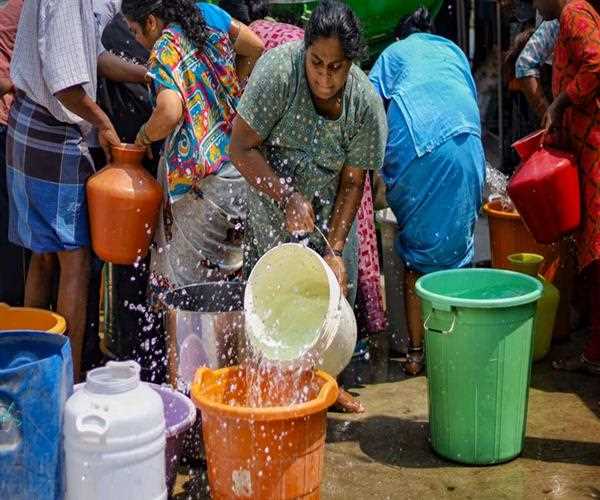
18-Mar-2024 , Updated on 3/18/2024 10:16:39 PM
Bangalore Water Crisis is a serious concern for India
The water supply crisis in Bangalore, India, has now reached a critical point; it presents a very big risk not only to our lives but as well as the city's further growth. The water shortage in Bangalore does not only affect the sub-millions of inhabitants of the city but also echoes across the country. This crisis is seen as the most critical due to its interlocking and multidimensional effect on daily survival, economic activities, environment sustainability, health, and politics.
Daily Struggles of Residents
Bangalore area has got a lot of chaos due to water scarcity in the daily routine. The challenge of running water becomes a daily obstacle for most of these individuals who usually spend hours on row the queue for water truck delivery. The worsening situation of water tankers’ sky-high prices adds to the stress of all the families who are struggling to get through this crisis. Alongside this, the water shortages impede small-scale activities such as food supplies, house cleaning, and personal hygiene, leaving residents with no choice but to ration water and prioritize their uses.
Economic Impact
The water shortage in Bangalore is not just inhabited by homes; it also involves companies and factories. While water-intensive production factories experience the expected decline in operations due to the interrupted water flow to the manufacturing and supply processes. Restaurants are burdened with surging water bills and since operational losses and eventually unprofitable businesses. These companies, operating in Bangalore, should put in place water conservation mechanisms and check their operations so that they can avoid making the situation even worse. The economic effects of the water crisis run through different sectors, affecting the entire local economy and the economic growth of the nation.
Environmental Degradation
The urbanization of Bangalore has been very fast and this development has led to the exhaustion of on-site natural water bodies while the physical environment is being degraded heavily. Cities lacking in forestation and reduced to concrete surfaces cannot absorb enough water, thus worsening the problem of water scarcity.
Moreover, persistent low levels of monsoon rains deepen groundwater deficit, thus progressively contributing to the cycle of environmental destruction. The poor water levels pose a large problem because they negatively impact the biodiversity and ecosystem dynamics and the whole ecological balance of the region.
Health and Hygiene Concerns
The water crisis in Bangalore threatens to have some of the most negative consequences on the health and hygiene of its residents. There is a lack of clean water thus sanitation activities become poor; this contributes to the illness because waterborne diseases could easily be contracted. It is children in particular that get hit hardest by the lack of proper hygiene, worsening an already desperate situation. Furthermore, the lack of availability of water for drinking, cooking, and personal hygiene weakens public health efforts and widens the gaps in health among socially vulnerable communities.
Political Implications
The political party in the Water Crisis has turned into a controversial issue in Bangalore, the local representatives of different political parties accuse each other of being responsible for the River water shortage. Meanwhile, in the political arena, the issues could be overlooked nonetheless people expect a quick rebuttal for the problems. The failure of the city to properly address the water problem not only undermines the trust of the general public but also the question hanging above the head of the future of the city. Also, the slow response of politicians and mismanagement of civil service worsens the conditions of the most vulnerable and causes more people to lose trust in public institutions.
Urgent Need for Action
Water crisis prevention in Bangalore has to start as a fast and coordinated action for all involved. The concerted efforts through government intervention, community involvement, and holistic water management programs will ensure that the crisis is properly handled. Investing in infrastructure, water conservation, and implementing strict regulations should be the major steps toward achieving water security in Bangalore and hence in the lives of its residents. In addition, the collaboration between the ministries, private sector, civil organizations, and academic institutions is the vital point for the development of integrated strategies for both root causes of crises and vulnerability to water-based challenges as well.
Conclusion
The water crisis in Bangalore is an alarming problem requiring urgent solutions and actions that will solve the problem soon. Being a tech capital and the epitome of urbanization, the city of Bangalore is battling with depleting water sources highlighting the common struggle of growing cities in the era of the 21st century. By tackling the basics of the crisis in the water sector and focusing on supportive solutions, Bangalore may become the sample city that moves the country towards a more water-resilient future. Nevertheless, water protection is a complicated endeavor that needs collective action, political commitment, and long-term consistency so that each and everyone has access to clean water.

Content writer
I am a content writter !
Join Our Newsletter
Subscribe to our newsletter to receive emails about new views posts, releases and updates.
Copyright 2010 - 2026 MindStick Software Pvt. Ltd. All Rights Reserved Privacy Policy | Terms & Conditions | Cookie Policy